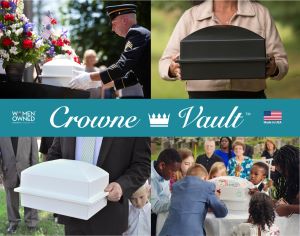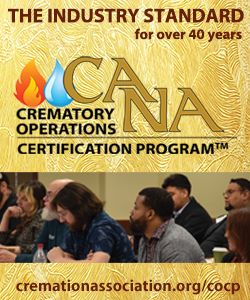Pension funds investment in Cremation is an interesting development

Pension funds and endowments have the responsibility of shepherding for safety, growth, and income their assets into a multitude of investments. I’ve learned that most of those types of investors invest in bonds and private debt for income and stocks for short-term growth. Some will invest up to 5% of the assets into new ventures hoping to make a better than average return on those funds while realizing that there is risk involved also.
But I’ve also learned that pension funds and endowments invest a very large percentage of their assets into what I would call “slow-growth” infrastructure that is not real liquid. Much of this type of investment is in commercial real estate, agricultural land, cell phone towers, storage facilities, and energy production infrastructure.
While stocks and bonds of funeral service companies have been bought and sold as investments for pension and endowment funds, I’m not sure if any pension fund or endowment fund has invested in what one might call “an infrastructure investment” in Death Care. If so, I’m trying to think of what that infrastructure would have been — maybe a cemetery?
I think that is what makes the recent acquisition by British pension fund manager Railpin of Horizon Ceremonies Limited unusual and an interesting play on the long-term cremation and ceremony outlook. According to this article, Railpin recently purchased Horizon, which is described as a United Kingdom-based operator and developer of crematoria from private equity company Maven Capital Partners.
Horizon operates three crematoria in Great Britain with what is described as “a strong pipeline of greenfield development sites in underserved areas across the UK, aligning with its mission to improve the experience and accessibility of cremation services nationwide”.
According to the linked article, “The business operates a B2B model, providing cremation services to funeral directors and direct cremation specialists, ensuring flexibility and choice for communities during the most sensitive times.”
The United Kingdom historical cremation model — What is different with cremation in the United Kingdom as compared to the United States is that crematories have traditionally been owned and operated by municipalities and not funeral directors in the UK. Consumers would arrange their loved one’s funeral through the funeral director but then go to the municipal crematory for a service and cremation.
In essence, the crematories are owned and operated by the municipality and consumers are charged for the crematory services by funeral directors much like “cash advances” are charged for items in the United States.
Railpin is counting on the ability to build new crematoriums through private enterprise to compete with many of the aging cremation infrastructure of municipalities. They are also counting on the increased use of Direct Cremation to build the numbers of cremation higher and higher.
Here’s what Tim Grimstone, Investment Manager at Railpin said about the Horizon investment:
“Our investment in Horizon is directly aligned with Railpen’s purpose of securing the future for our members by delivering strong, diversified investment returns while having a positive impact on the communities in which we invest. The UK is facing a clear demographic need for new, high-quality crematoria, and Horizon’s award-winning track record and commitment to sensitive, well-designed facilities positions them to meet that demand. By backing Horizon’s growth, we are investing in critical social infrastructure that will provide sustainable income streams to support our members’ pensions.”
Related — For an idea of a British Crematorium here is a 1-minute video tour of Pure Cremation’s original facility

Tom Anderson
Funeral Director Daily
Funeral Director Daily take: I find this development extremely interesting to our profession. To me, I see a private company investing in “Death Care” to build-out and take-over municipal infrastructure in Great Britain. Quite frankly, it looks like a long-term goal of Horizon, under Railpin’s ownership, is to move ceremony and cremations in Great Britain from a municipal facility to a facility that is owned by private concerns.
And, I would also add that in most instances a private company will be able to operate a more efficient and consumer friendly business than a municipality can. If they succeed in replacing municipal crematories, Horizon will bring great value to this infrastructure and Railpin pensioners.
Quite frankly, it is very much like Pure Cremation did when building their own crematory and ceremony facility to serve the London area. . . .and, if selling for $400 million dollars 10 years later is considered successful, then Pure Cremation was very successful.
What about this happening in the United States: The crematory system is fundamentally different in the United States than it is in Great Britain which would make this type of investment questionable in the U.S. The U.S. already has independently owned business crematories so there is no municipality crematories to replace and operate in a more efficient manner.
However, what I think is interesting is thinking about “Death Care” not in an operational business vernacular but in an “infrastructure” vernacular. We will always have deaths and we will always need infrastructure to care for deaths.
Thinking of parts of the business as “infrastructure” rather than “business operations” may allow much more well-heeled financing into the Death Care business. For instance, would a real estate investment trust consider building the infrastructure out for a group of “Celebration Centers” across a region or the country to be managed by an operating company? The “Celebration Centers” could be chosen by families for celebrations, services, lunches, visitations, and the like.
Or, would that same type of real estate investment trust be interested in building out new and modern facilities for an existing funeral home operator on a lease-back type of arrangement? I think that is possible too.
Pension funds and endowment funds would not be so focused on the annual return as they would the long-term real estate appreciation in value over time. And, in my book, that brings a lot more potential investors to the plate in Death Care who would look for their returns in a patient fashion.
Learning about Pensions and Endowments: When I served on the University of Minnesota Board I learned much about pension and endowment investing. Most people don’t even realize it, but at the U of M and many other colleges, we had an Office of Investment and Banking (OIB) — you can get a description of the U of Minnesota’s office here.
The OIB was tasked with operating everything from our own insurance company to the endowment fund to retirement plans. I chaired the Debt Management portion for four years and learned much about the world of big finance. One of the things I loved to do in that position was talk, in general terms, of the investment world with our Chief Investment Officer. Sometimes it was just fascinating to see where our money was invested. . . . . Oh, and it was public money so from time to time we had to have the discussions about fossil fuels and ESG investing (Environmental, Social, and Governmental) options.. . . .All in all, it was a great learning experience for this small-town funeral home operator.
More news from the world of Death Care:
- 5 things to say when someone dies: Funeral directors share what truly comforts the grieving. The Courier-Journal (AL)
- A return to earth: What is natural burial and why are Vermonters choosing it? The Valley Reporter (VT)
- More eco-friendly than cremation. The Chatham Voice (Ontario, Canada)
- Fire at funeral home in Seattle was intentionally set. Video news story and print article. Fox 13 – Seattle (WA)
- New owners take over Schad and Zabel Funeral Homes. Yahoo News from the Rochester Post-Bulletin (MN)
Enter your e-mail below to join the 3,199 others who receive Funeral Director Daily articles daily
“A servant’s attitude guided by Christ leads to a significant life”




















